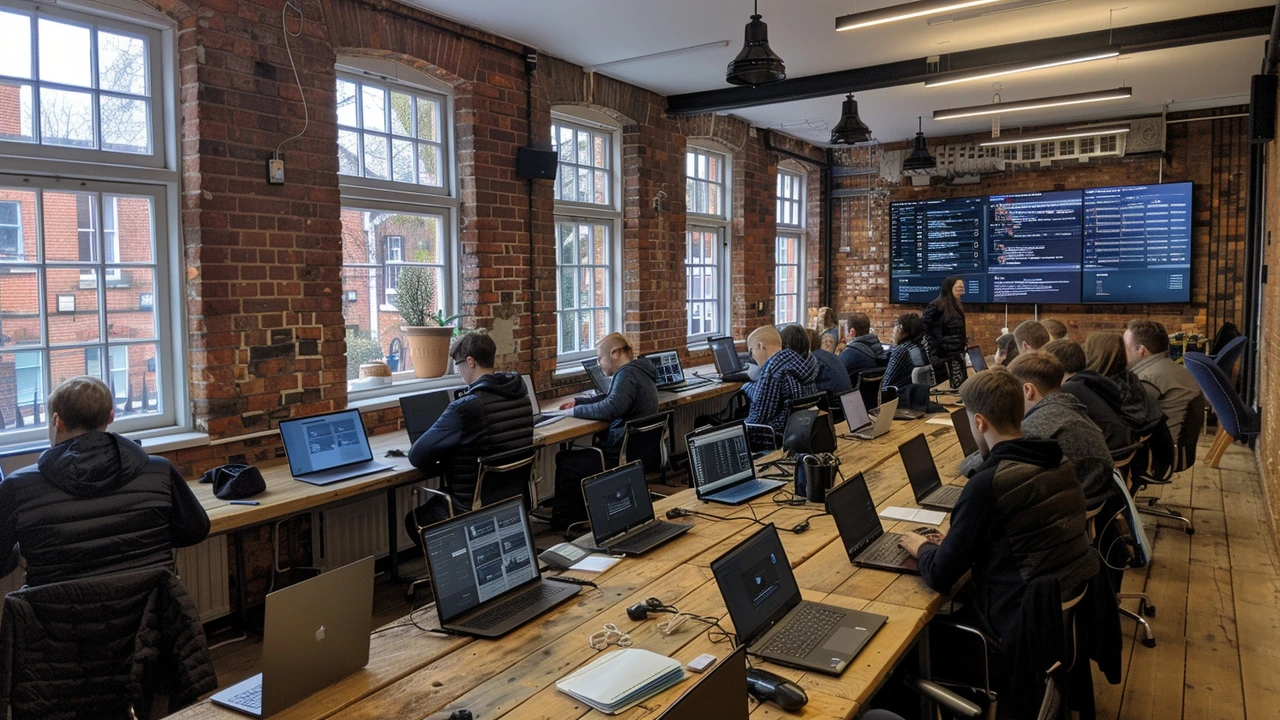Mastering AI Coding: Essential Skills for Future Generations

Artificial Intelligence (AI) is transforming the world we live in. From virtual assistants to self-driving cars, AI is behind some of the most exciting technological advancements today. As we look to the future, coding for AI is becoming an essential skill for the next generation.
Understanding the basics of AI and learning how to code for it can open up a world of opportunities. It's not just for tech enthusiasts; it's a valuable skill that will be useful in many fields. Let's dive into why coding for AI matters and how you can get started.
- Introduction to AI and Coding
- Why Coding for AI Matters
- Getting Started with AI Coding
- Useful Resources and Tools
- Real-World Applications of AI Coding
- Tips for Learning and Progressing
Introduction to AI and Coding
Artificial Intelligence, commonly referred to as AI, is no longer just the stuff of science fiction. It's a significant part of our daily lives, quietly working behind the scenes in ways we don't always notice. Ever asked Siri or Alexa a question? That's AI at work, understanding your request and providing an answer. AI is also what helps Netflix suggest movies or shows you might like based on your viewing history. It's a blend of science, algorithms, and data that allows machines to perform tasks that usually require human intelligence.
Coding, on the other hand, is the process of using a programming language to get a computer to behave how you want it to. It's like speaking a language that the computer understands. Combining coding with AI involves writing programs that allow these systems to learn from data, improve over time, and make intelligent decisions. It's a bit like teaching a child – you feed the system with examples, and it learns patterns to make its own decisions.
History of AI
The concept of AI isn't new. The idea of creating machines that can think can be traced back to ancient times. However, it wasn't until the mid-20th century that AI really began to take shape as a scientific field. In 1956, John McCarthy, Marvin Minsky, and other pioneers coined the term 'Artificial Intelligence' during a conference at Dartmouth College. They believed that every aspect of learning or any other feature of intelligence could, in principle, be described so precisely that a machine could be made to simulate it. Fast forward to today, and we have AI systems that can beat chess grandmasters, paint art, and even write articles.
"Artificial Intelligence is the future and the future is here." – Dave Waters
This intersection of AI and coding represents a powerful toolkit for building the future. The potential applications are nearly limitless, from healthcare to finance, to smarter cities and beyond. But before diving headfirst into the world of AI, it's essential to understand how these two fields interlink and empower each other.
One of the foundational elements of AI is machine learning. This subset of AI focuses on building systems that can learn from and make decisions based on data. Python is a popular language for this purpose due to its simplicity and extensive libraries like TensorFlow and PyTorch. If you're aiming to code for AI, Java and C++ are also worth knowing because they're used in many AI applications, including search engines and self-driving car systems.
Importance for the Next Generation
As technology continues to evolve at a rapid pace, coding for AI is a skill gaining immense importance. It's estimated that by 2025, AI could contribute up to $15.7 trillion to the global economy, according to PwC. This significant economic impact underscores the need for the next generation to be proficient in AI technologies. Schools and higher education institutions are increasingly including AI and coding in their curriculum, recognizing their importance in preparing students for future job markets. Kids who learn these skills now will not only be tech-savvy but will also be more adaptable in an AI-driven world.
AI isn't just for developers or computer scientists. Its cross-disciplinary nature means it has applications in various fields including medicine, where AI helps in diagnosing diseases; finance, through algorithms that predict market trends; and even creative fields like music and art where AI can compose original pieces.
Why Coding for AI Matters
As the world continues to integrate more technology into daily life, AI coding stands out as one of the most important skills the next generation can learn. Understanding why this is the case requires a look at both the present and future implications of AI. Today, AI is used in various fields including healthcare, finance, and education for tasks ranging from diagnosing diseases to predicting stock market trends. This widespread use makes learning to code for AI incredibly valuable.
By mastering AI coding, individuals can contribute to innovations in these critical areas. In healthcare, for instance, AI algorithms are being used to analyze medical images, track patient health data, and even assist in surgery. According to a report by Accenture, AI in healthcare could save the industry up to $150 billion annually by 2026. Being part of this transformative technology brings a sense of accomplishment and purpose.
On the employment front, the demand for AI experts is soaring. Positions such as AI engineers, data scientists, and machine learning specialists are among the most sought-after in the tech job market. The Bureau of Labor Statistics projects that jobs in these fields will grow by 15% from 2019 to 2029. This rapid growth translates to exciting career opportunities for those with AI coding skills, providing them not just with jobs but with roles that are integral to future technological advancements.
Understanding how to code for AI also plays a role in fostering innovation. When people can create their own AI applications, they unlock the potential to solve unique problems. For instance, entrepreneurs in tech can develop AI-driven solutions tailored to their industry needs, pushing the boundaries of what's possible. The potential for AI to address global challenges such as climate change or cybersecurity threats should not be underestimated, as it continues to evolve and improve.
Learning AI coding also enhances problem-solving and analytical skills. The nature of programming AI systems requires a high level of logical thinking and creativity. These skills are not only valuable in tech but are also transferable to many other professions, making those who possess them more adaptable and capable. The process of teaching AI to learn, recognize patterns, and make decisions is intricate, yet it trains the brain to approach problems methodically.
According to Sundar Pichai, CEO of Google, “AI will be more profound than electricity or fire.” This statement emphasizes the transformative power AI holds for our future and why learning to code for it is so crucial.
Moreover, coding for AI fosters a collaborative environment. Developing AI technologies often requires teamwork, involving experts in various fields such as mathematics, psychology, and ethics. This interdisciplinary approach not only leads to more robust AI solutions but also encourages the exchange of ideas and perspectives. These collaborations often result in more innovative and ethically sound AI technologies.
Lastly, let’s not forget the personal growth and satisfaction that comes from learning AI coding. Tackling challenging problems and seeing your code come to life in the form of sophisticated AI behaviors can be incredibly rewarding. Whether it’s through creating a personal project or contributing to a larger team, the sense of achievement is significant.

Getting Started with AI Coding
Starting with AI coding might seem intimidating at first, but breaking it down into manageable steps can make the process smoother. First, it's crucial to build a solid foundation in programming languages that are commonly used in AI development. Python is often the go-to language because of its simplicity and a massive collection of libraries tailored for AI, such as TensorFlow and PyTorch. JavaScript and R are also gaining popularity in the AI community.
Learning the basics of data structures and algorithms is another important step. Since AI heavily relies on data, understanding how to organize and manipulate it effectively gives you a strong edge. Online platforms like Coursera, Udacity, and Khan Academy offer comprehensive courses on these topics. Investing time in these courses can help you develop a deeper understanding of the core concepts.
Once you are comfortable with a programming language and data structures, exploring machine learning (ML) algorithms is the next step. Machine learning is a subset of AI where systems can learn from data. Some common algorithms include linear regression, decision trees, and neural networks. Platforms like Kaggle provide practical challenges where you can apply these algorithms to real-world problems. Such hands-on experience is invaluable.
"Machine learning will automate jobs that most people thought could only be done by people." — Dave Waters
After grasping the fundamentals of ML, diving into deep learning (DL) opens up even more possibilities. This subset of ML involves neural networks with many layers and is used in cutting-edge technologies like image and speech recognition. Books like 'Deep Learning' by Ian Goodfellow and online resources from MIT and Stanford can be quite enlightening on this topic.
Building projects is an excellent way to solidify your knowledge. Start small—create a simple chatbot or a recommendation system. As you gain confidence, move on to more complex projects like facial recognition systems or autonomous robots. GitHub is a great place to share your work and find inspiration for new projects. Engaging with the community by participating in forums, online discussions, and hackathons can provide additional support and feedback.
Lastly, never underestimate the importance of staying updated. AI is a fast-evolving field, with new breakthroughs happening regularly. Subscribing to journals like the Journal of Artificial Intelligence Research or following blogs like Towards Data Science can keep you informed about the latest trends and advancements. Continuous learning is the key to staying relevant and ahead in this dynamic field.
Useful Resources and Tools
When it comes to learning AI coding, having the right resources and tools can make a world of difference. The journey to mastering AI programming might seem daunting, but there are numerous materials and platforms designed to make the process easier.
One of the most popular and beginner-friendly resources is Coursera. This platform offers a variety of courses on AI and machine learning, taught by experts from top universities like Stanford and MIT. These courses often include practical exercises that help learners apply what they’ve learned in real-world scenarios.
Another fantastic resource is edX. Similar to Coursera, edX provides courses from leading institutions. The AI courses available on edX range from introductory to advanced levels, ensuring there’s something for everyone, whether you're just starting out or looking to deepen your knowledge.
For those who prefer a more hands-on approach, Kaggle is a perfect choice. Kaggle is a platform specifically designed for data science and AI enthusiasts. It hosts numerous datasets for practice and also runs competitions that challenge participants to come up with innovative solutions to real-world problems. This can be a great way to test your skills and learn from the best in the field.
Don't overlook the value of open-source libraries like TensorFlow and PyTorch. These tools are widely used in the industry and have extensive documentation and community support. By working with these libraries, you can gain experience with the actual tools used by AI professionals and developers.
Online books and tutorials also serve as valuable resources. One notable mention is 'Hands-On Machine Learning with Scikit-Learn, Keras, and TensorFlow' by Aurélien Géron. This book is well-regarded for its practical approach and clear explanations, making it suitable for learners of all levels.
'AI and its applications are growing exponentially, and having a robust understanding of AI coding will be crucial for future generations.' - ForbesWebsites like Medium and Towards Data Science often publish articles and tutorials on AI projects, best practices, and the latest trends. Reading these can keep you updated with the newest developments in the field.
Lastly, don't underestimate the power of community involvement. Joining forums like Stack Overflow, Reddit’s r/MachineLearning, or even attending local meetups and conferences can provide support and inspiration. Networking with others who share the same interests can lead to collaborations and mentorship opportunities, both of which are invaluable in the learning process.
By leveraging these resources and tools, anyone interested in AI coding can make significant strides towards becoming proficient. The key is to stay curious, keep practicing, and never be afraid to seek help from the wealth of knowledge available online and within various communities.

Real-World Applications of AI Coding
AI coding isn't just a buzzword; it’s a transformative force in various industries. Whether it's healthcare, finance, retail, or transportation, AI algorithms are redefining how tasks are accomplished. Take healthcare, for instance. AI-driven systems can analyze medical images with remarkable accuracy, often surpassing human capabilities. These algorithms can detect diseases early and recommend personalized treatment plans based on patient data.
In finance, AI is used to predict stock trends, assess risks, and enhance fraud detection. Automated trading systems analyze vast amounts of data in real time, making fast and informed decisions that humans might miss due to data complexity. This not only improves efficiency but also increases profitability. As Jamie Dimon, CEO of JPMorgan Chase, once said,
Artificial intelligence is critical to our company's future. It provides unprecedented insights and streamlining in financial services.
Retailers are also capitalizing on AI coding for better customer experiences. Personalized shopping recommendations, driven by AI algorithms, are tailored to individual preferences based on browsing history and purchase patterns. This boosts sales and customer satisfaction. E-commerce giants like Amazon and Alibaba have been at the forefront, revolutionizing how we shop online.
Transportation has perhaps seen some of the most dramatic changes. Self-driving cars are no longer a sci-fi fantasy. Companies like Tesla are implementing AI to create vehicles that can navigate and make decisions without human intervention. This promises to reduce accidents and improve traffic flow, changing how we commute. In logistics, AI helps in optimizing routes, managing fleet operations, and even predicting maintenance needs, reducing costs, and increasing efficiency.
The entertainment industry isn't left behind; AI coding curates personalized content for users. Streaming services like Netflix and Spotify use AI to recommend shows and music that match your tastes. This makes the user experience more enjoyable and keeps them engaged longer. For film and game developers, AI tools assist in creating realistic graphics and characters, saving countless hours of manual work.
AI coding is also making strides in agriculture. Smart farming techniques leverage AI to monitor crops, predict weather patterns, and automate irrigation systems. This leads to higher yields and more sustainable farming practices. Data on soil health, crop growth, and pest activity are analyzed in real time, giving farmers the tools and insights to make informed decisions.
These examples demonstrate that AI coding isn’t limited to the tech sector. Its applications in real-world scenarios are broad and impactful, offering numerous opportunities for innovation across different fields. If you are considering diving into AI coding, you're not just learning a technical skill; you're contributing to the future of multiple industries and creating solutions that can change the world.
Tips for Learning and Progressing
Diving into the world of AI coding can feel overwhelming at first, but with the right approach, you can make steady progress. A key start is to build a strong foundation in programming. Languages like Python are highly recommended due to their ease of use and extensive libraries for AI and machine learning.
Engage in online courses and tutorials that offer hands-on projects. Platforms like Coursera, edX, and Udacity provide numerous courses that cater to different expertise levels. Joining a community can be incredibly beneficial. Websites like GitHub, Stack Overflow, and even Reddit have active AI and coding communities where you can ask questions, share knowledge, and collaborate on projects.
Regularly practicing coding is crucial. Try to write code every day, even if it's for a short period. Building small projects can help solidify your understanding and give you the confidence to tackle more complex problems. Keep challenging yourself by working on diverse projects - from automation scripts to more intricate AI models.
Reading up-to-date research papers and AI blogs is another excellent way to stay informed about current trends and innovations in the field. Publications like arXiv and websites like Towards Data Science are useful resources. If you're feeling ambitious, start contributing to open-source projects. It's a fantastic way to gain real-world experience and collaborate with other developers.
Investing time in learning about the mathematical concepts behind AI can significantly enhance your skills. Topics like linear algebra, calculus, and probability are fundamental in understanding how algorithms work. There are many resources available, including textbooks and free online materials like Khan Academy and MIT OpenCourseWare.
“The future belongs to those who learn more skills and combine them in creative ways.” - Robert Greene
Don't shy away from using AI frameworks and libraries. TensorFlow, Keras, and PyTorch are widely used in the industry and can simplify the process of developing AI models. These frameworks often come with excellent documentation and community support, making it easier to troubleshoot any issues you encounter.
Lastly, setting realistic goals and tracking your progress can keep you motivated. Whether it's completing a course, building a specific project, or contributing to an open-source initiative, having clear milestones can help you stay focused and motivated.